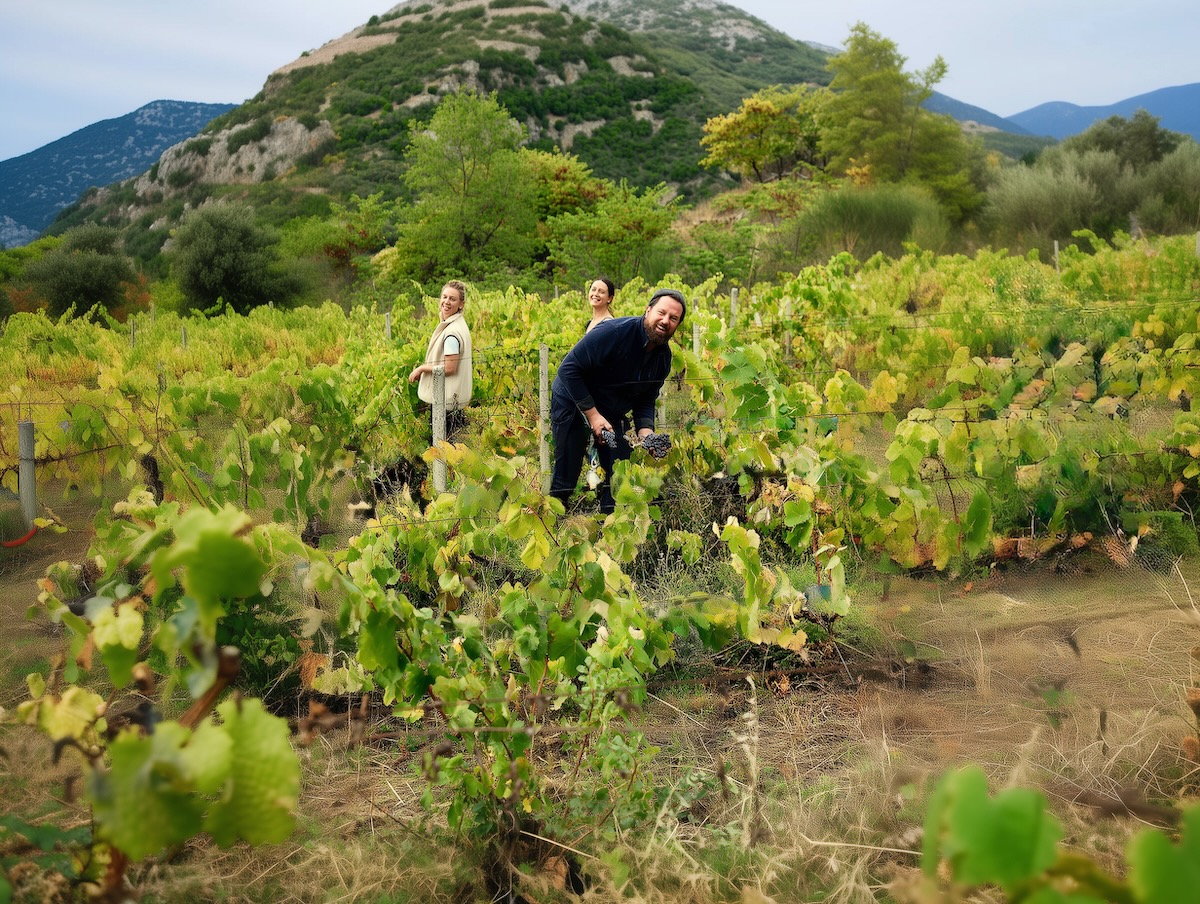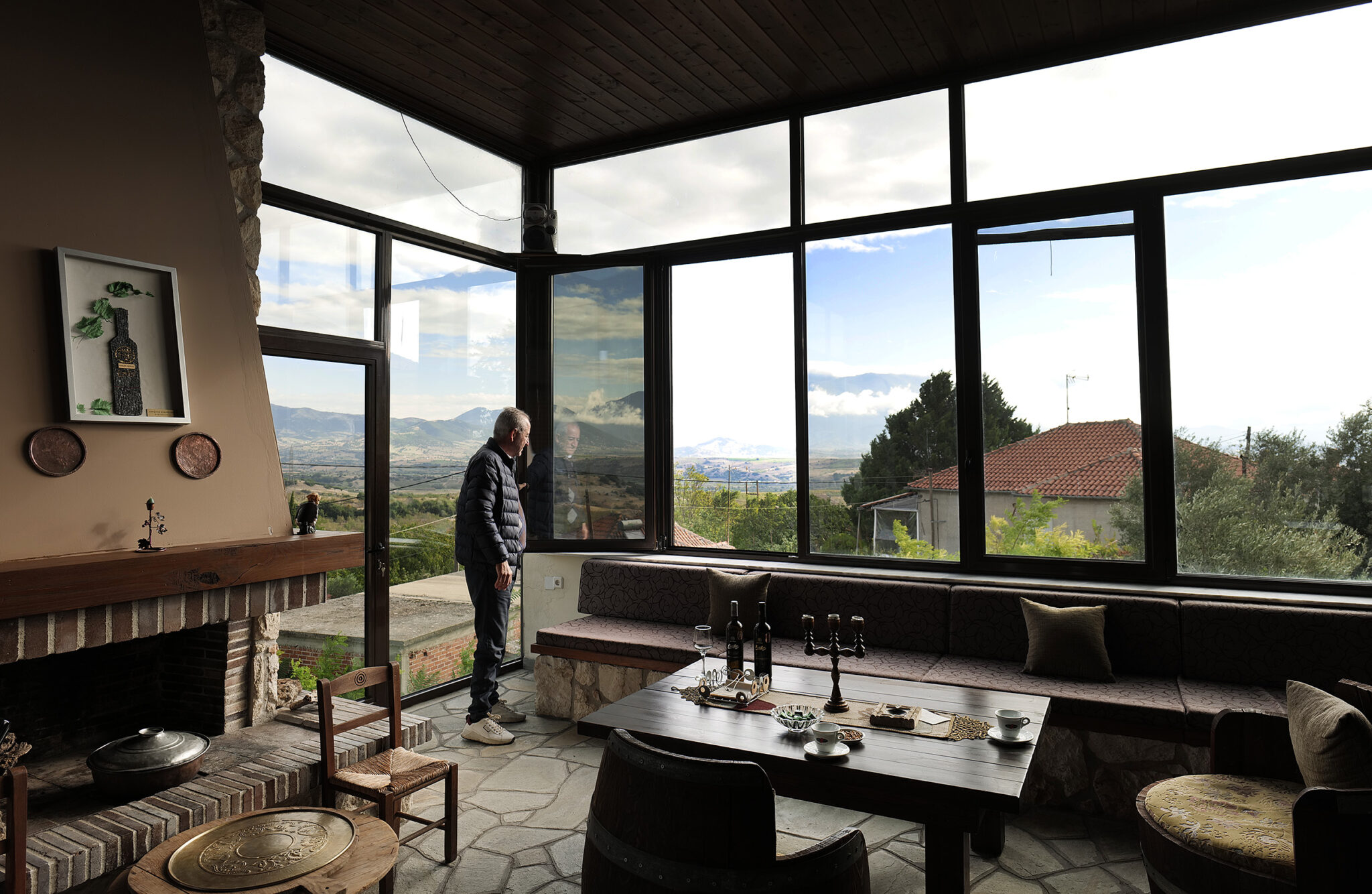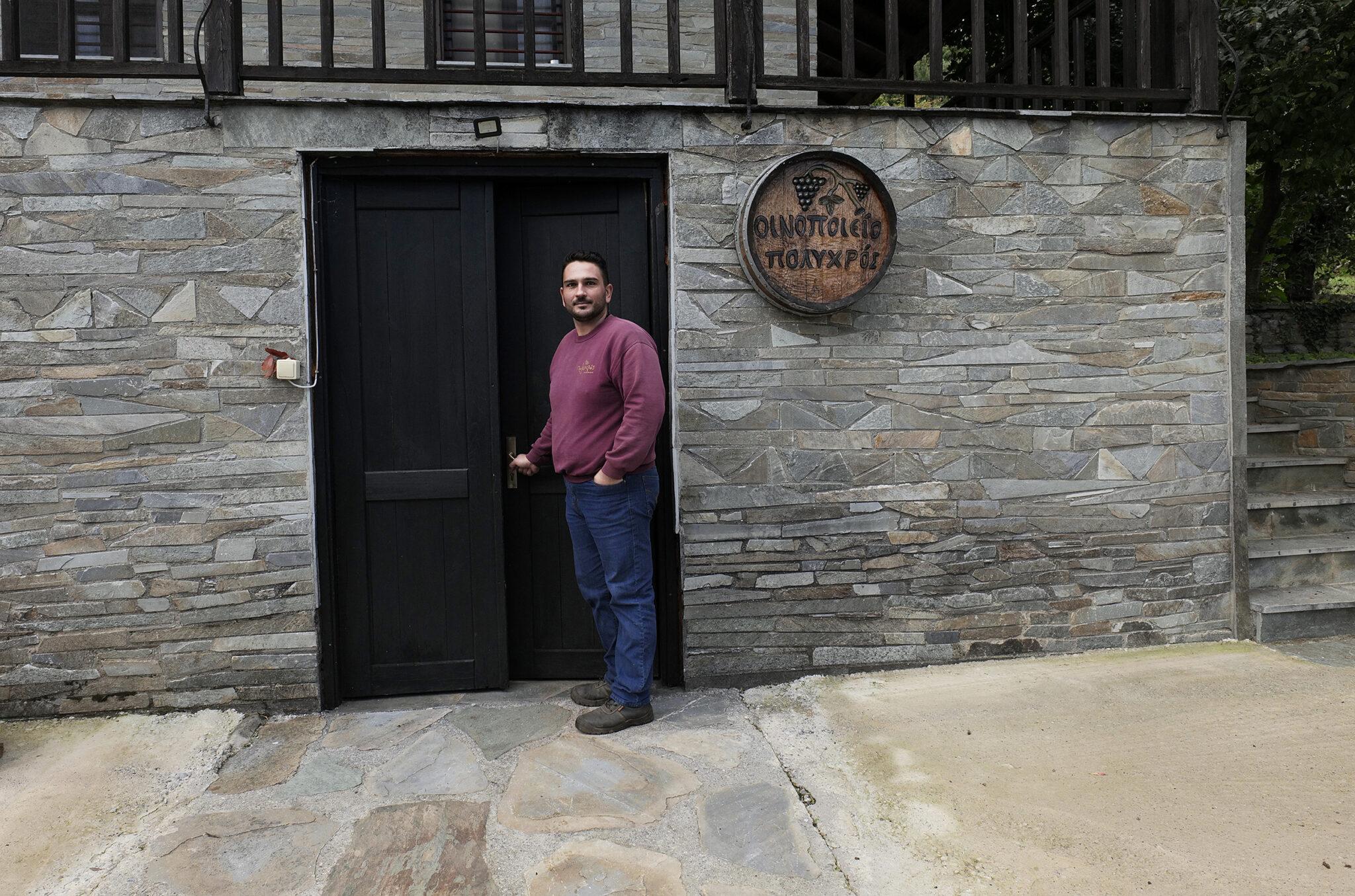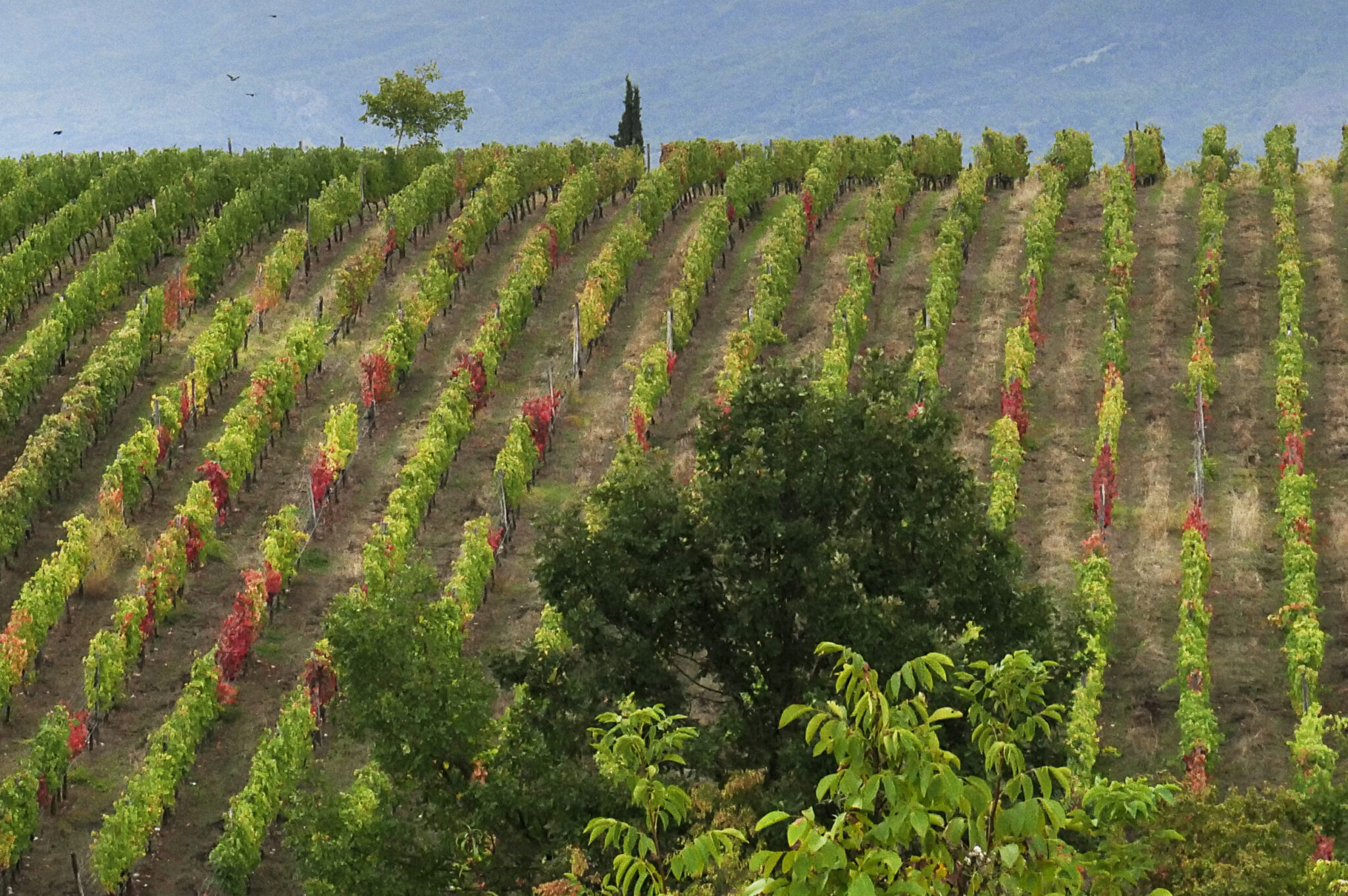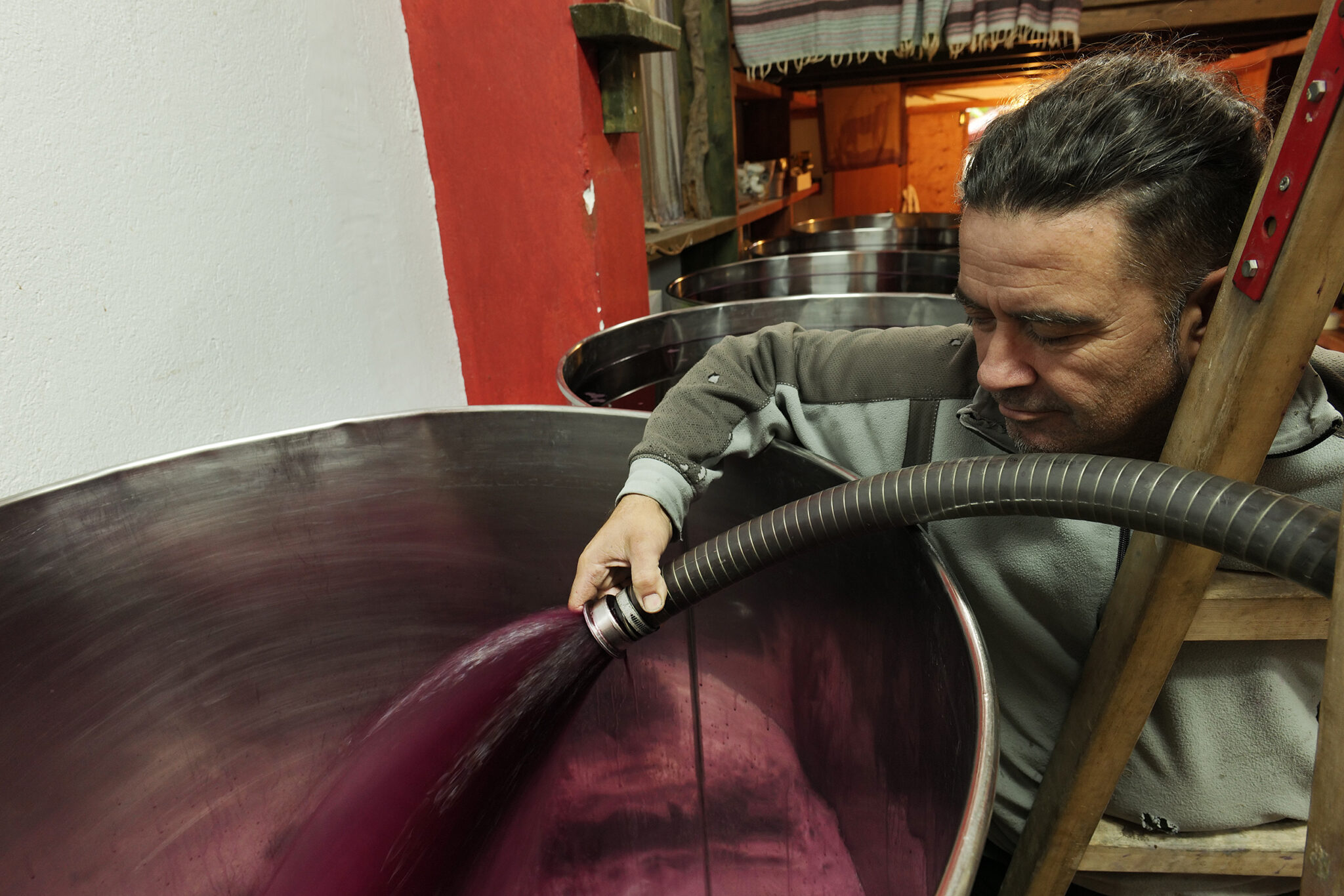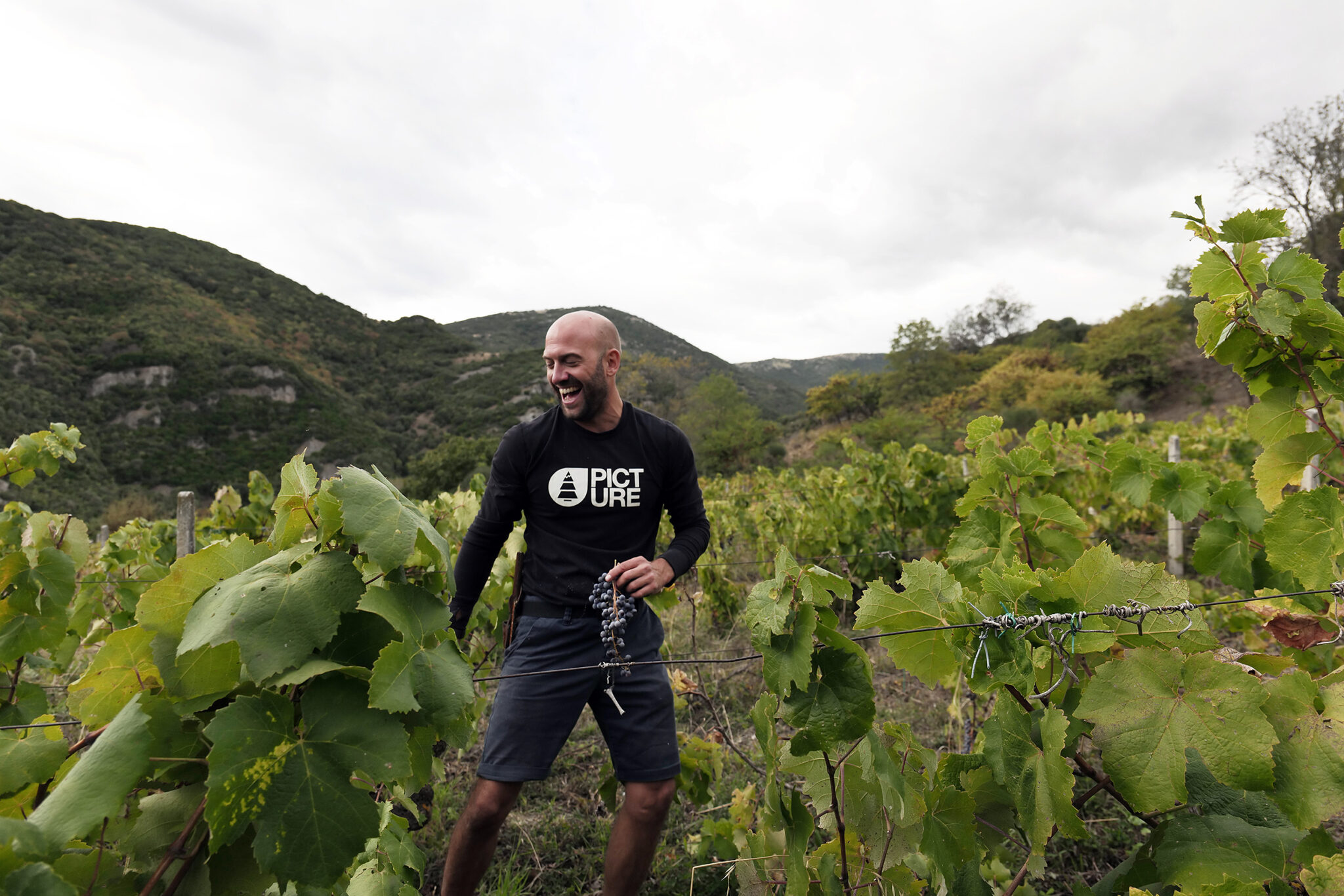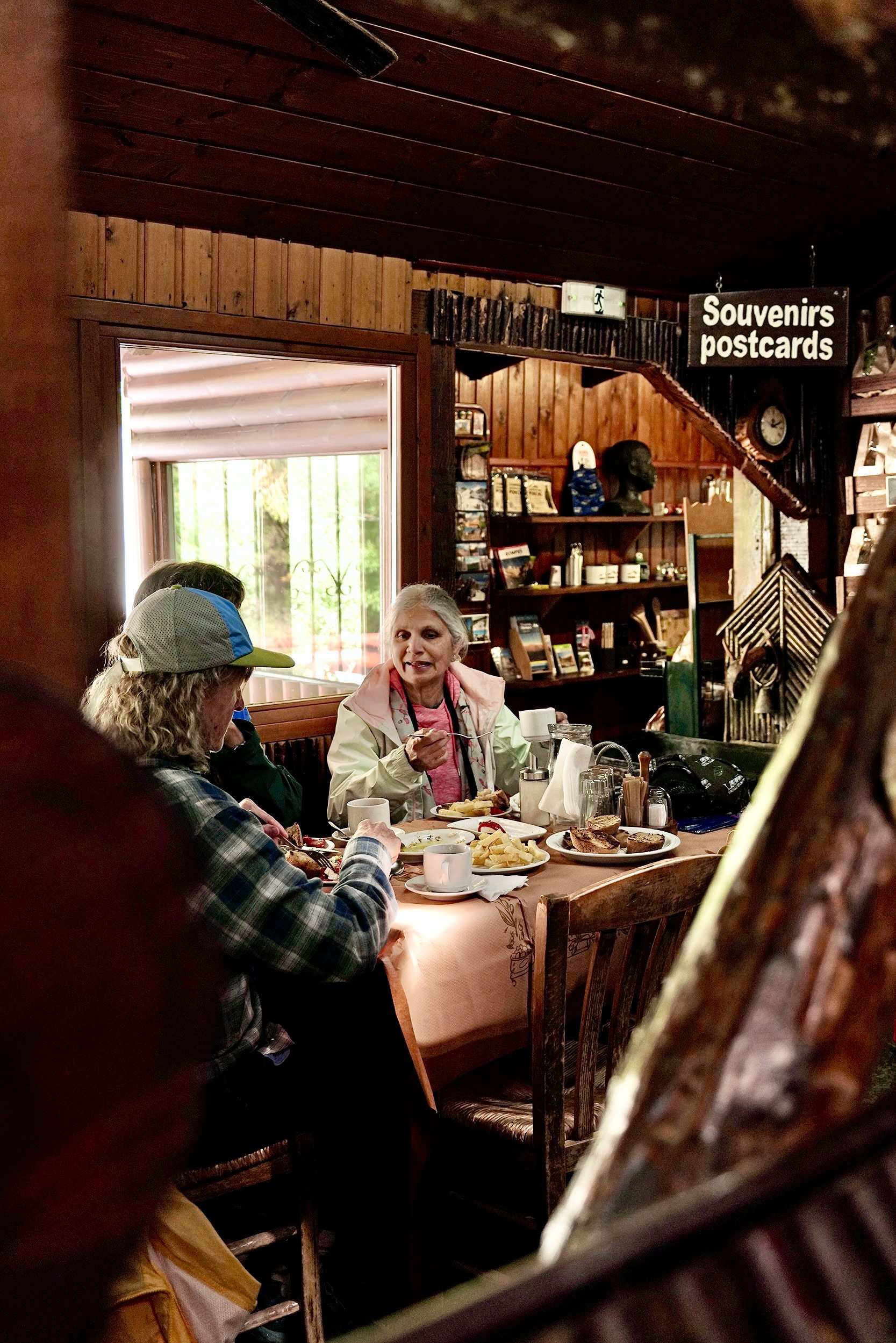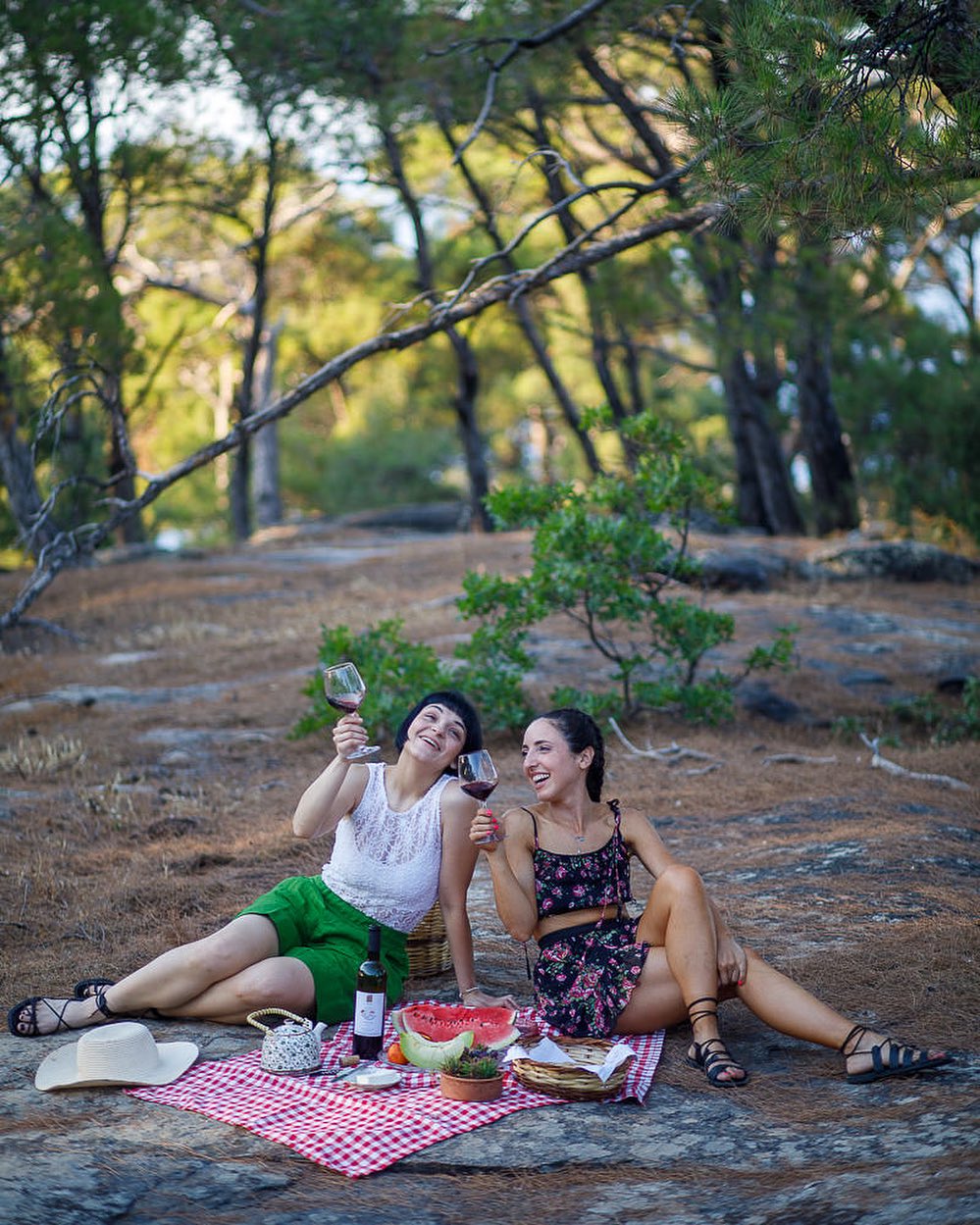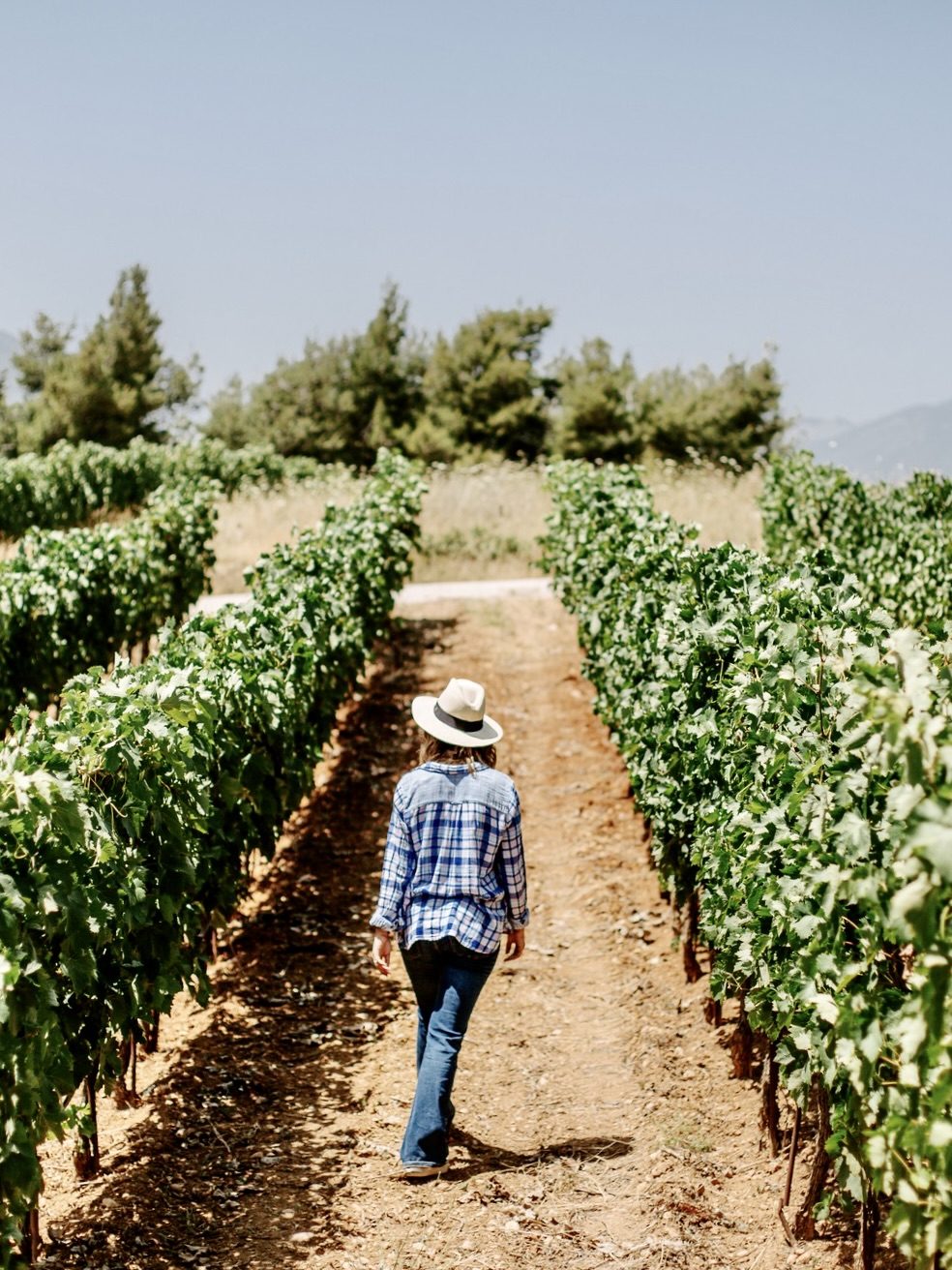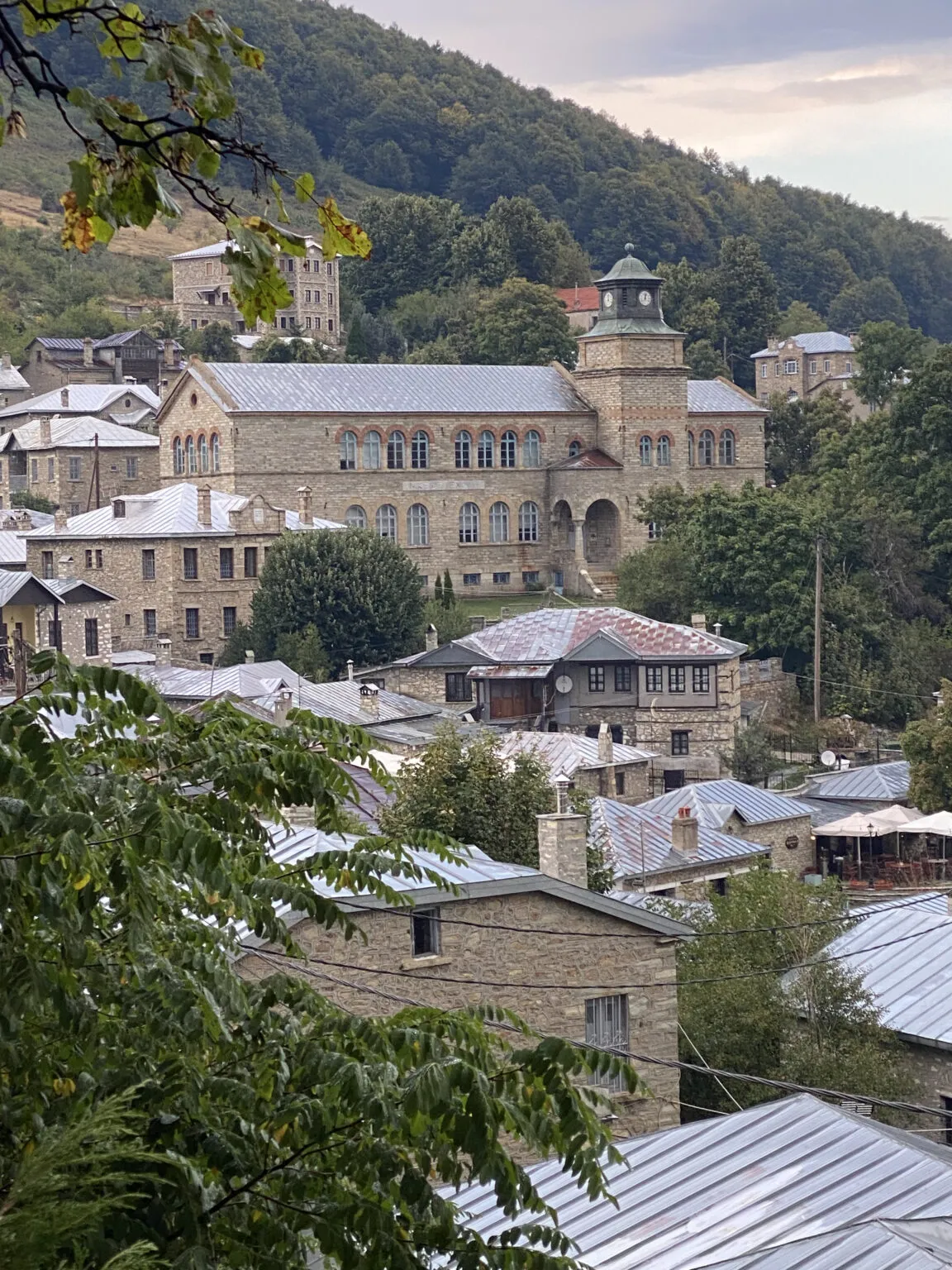Join us on a wine journey along the foothills of Mt Olympus, in which we discovered enticing stories about the regions’ lively wine culture, the winemaking process and life on the vineyard as shared by those who put their all into running them.
Literally set at the 4 corners of ‘the mountain of the gods’, these wineries are immersed in natural beauty and have a rich variety of soils. We experienced the constant shift of the landscape and a provincial community of people who revealed a way of being that was deeply engaging, flavorful and outward-looking.
Photography by Nikos Kokkas
01
Ktima Sakis Minas

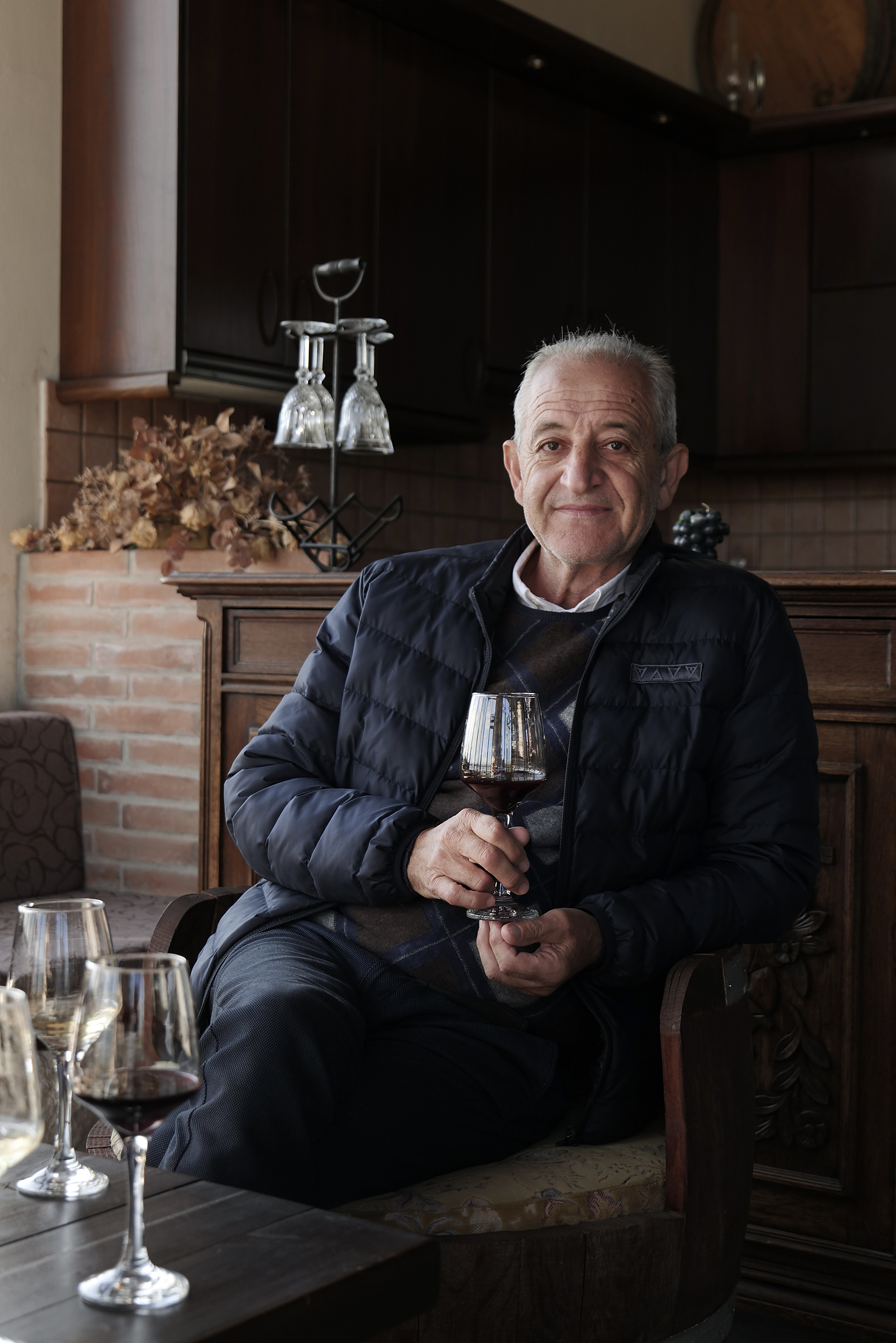
Our meeting with organic grower Sakis Minas was arranged fairly early in the morning, because he had commitments in the city of Larissa before midday. We woke up that day in the town of Litochoro, on the eastern side of Mount Olympus, in the region of Pieria. The GPS we checked the previous evening promised a circular route around Greece’s highest mountain, taking us a few kilometers into the prefecture of Larissa.
Mount Olympus is wrapped in clouds, sometimes revealing its peaks, sometimes hiding them entirely, sending the sunlight to pick out only certain spots on the plain that stretches in front of us. The thermometer reads eight degrees celcius; the road shines with early-morning moisture.
Before reaching Milea Sarantaporou in Elassona, where the winery is based, the road runs in long straight lines between cultivated fields, low vegetation, and small flat villages. Sakis Minas welcomes us warmly, with a broad smile and an air of quiet satisfaction at this morning visit. We pass through the tank room and sit in the main reception area, all warm wood tones, a large fireplace, solid, weighty furniture, and broad windows looking out to Olympus, which continues its game with the ever-moving clouds.
Even though it is early in the day, right after the first sips of Greek coffee, we ask to taste his wines as we sit facing each other. He tells us that from 1983 to 1990 he worked on his father’s crops – almonds, walnuts, and a little wheat. He planted his first vines in 1995, on five quarter acres, with 10 different varieties, to see which ones the land preferred here at seven hundred meters altitude, in sandy-loam soil with plenty of stone.
For the first five years he watched, took notes, and learned constantly until 2000, when he took the step of opening the winery. The five quarter acres have since become fifty, with merlot, cabernet, syrah, and limniona forming the estate’s excellent labels, either in blends or as single-varietal wines, always under organic cultivation.
A glimpse of the mountain in the distance briefly distracts us before Sakis brings us back to his story with a clink of glasses as we taste the red “Evioto.” He studied viticulture and oenology at the public IEK in Larissa after opening the winery, then continued his training in Athens at a tasting school for a year, followed by a year of viticulture and a year of oenology at Aristotle University’s lifelong learning program.
And once he had built up that momentum, he spent a year at a winery in Bordeaux, where he learned how to make red wines. It feels, even without him saying it, that “lifelong learning” is imprinted in his DNA, shared equally with the enthusiasm he radiates. As a mindset, a culture, a way of life, he believes in farming without chemicals or synthetic fertilizers, using natural fertilization from his own compost.
When we say goodbye, he personally places a small gift for me on the back seat of the car and informs us that he is also president of the organic growers’ association of Thessaly.
02
Polychros Winery

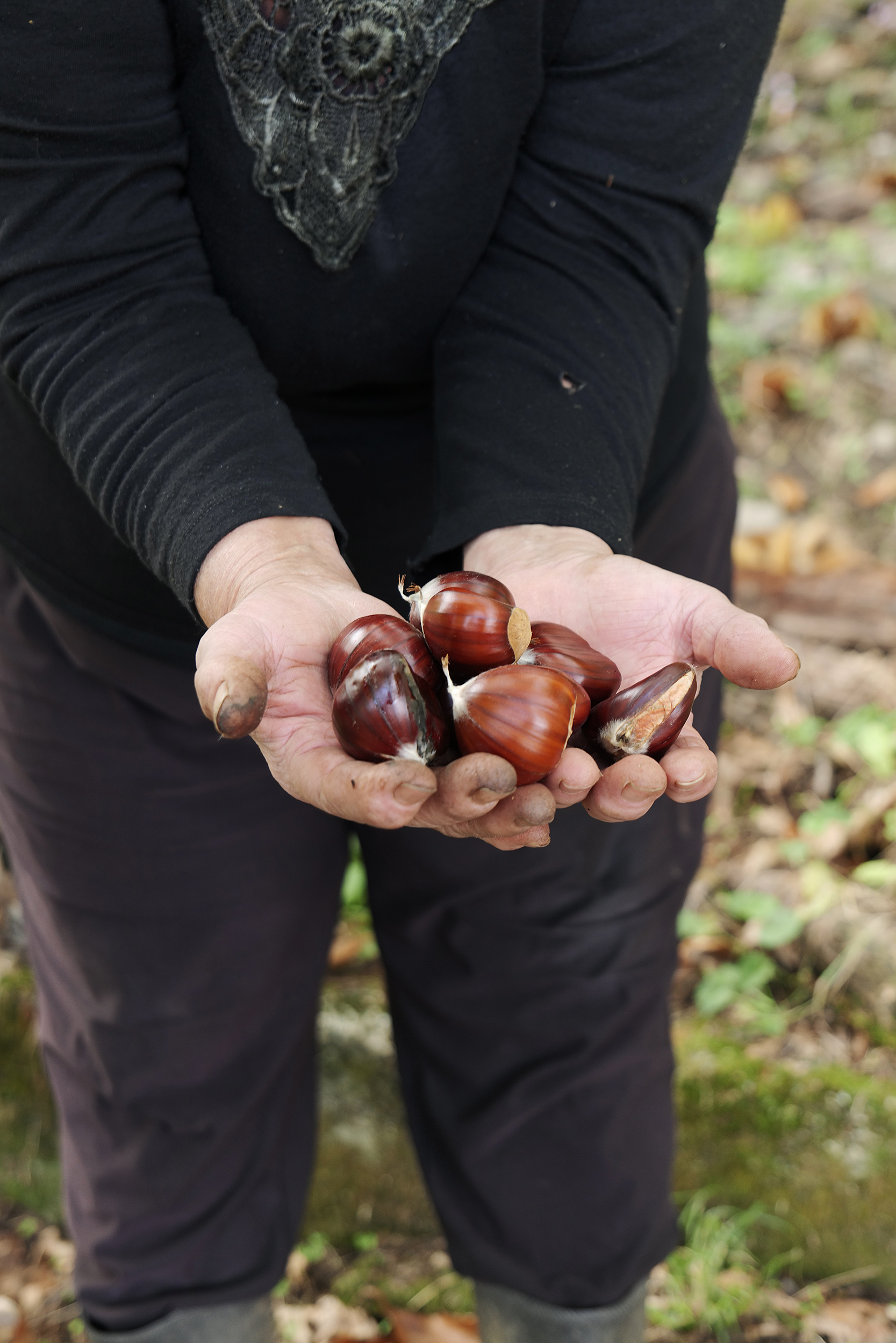
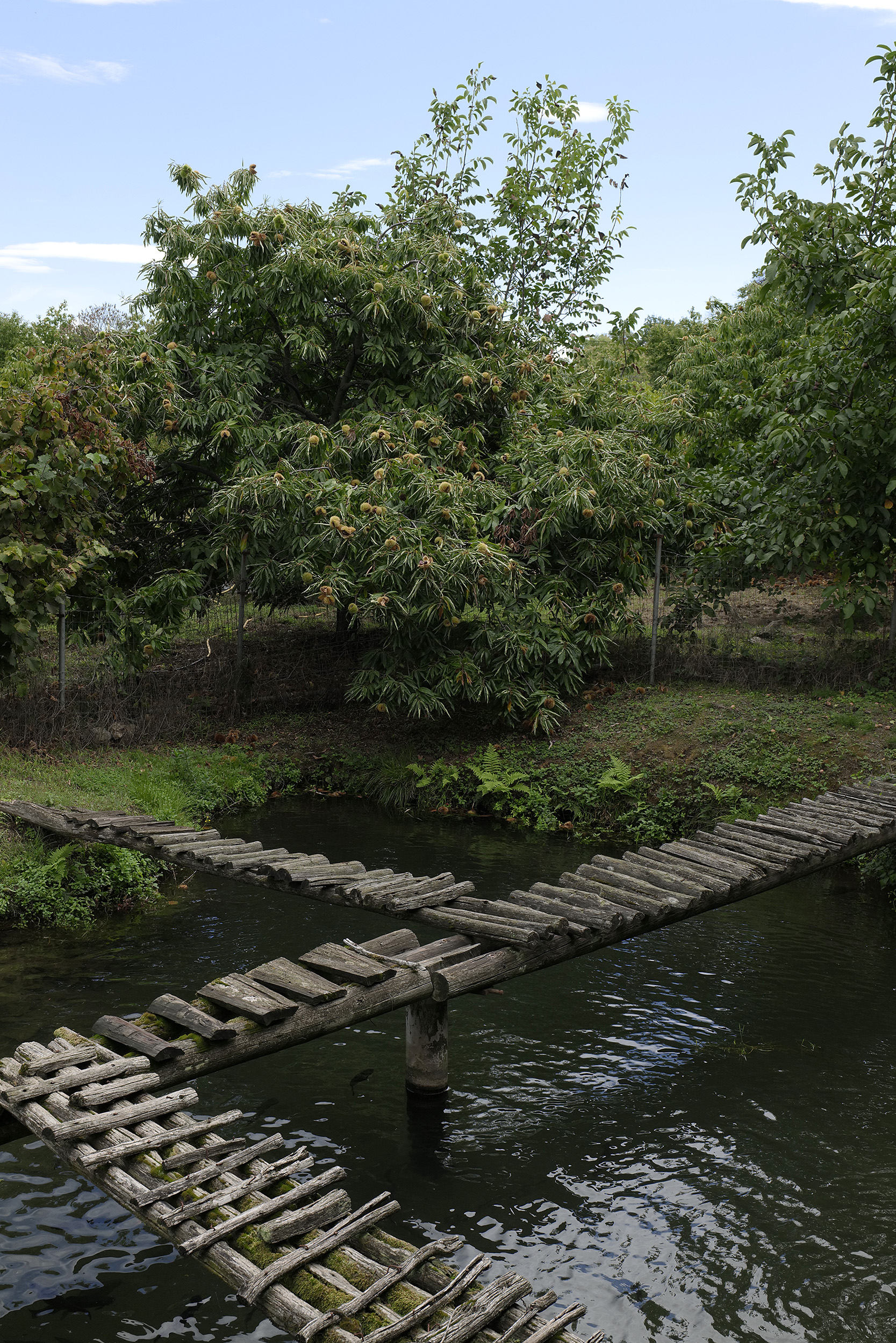
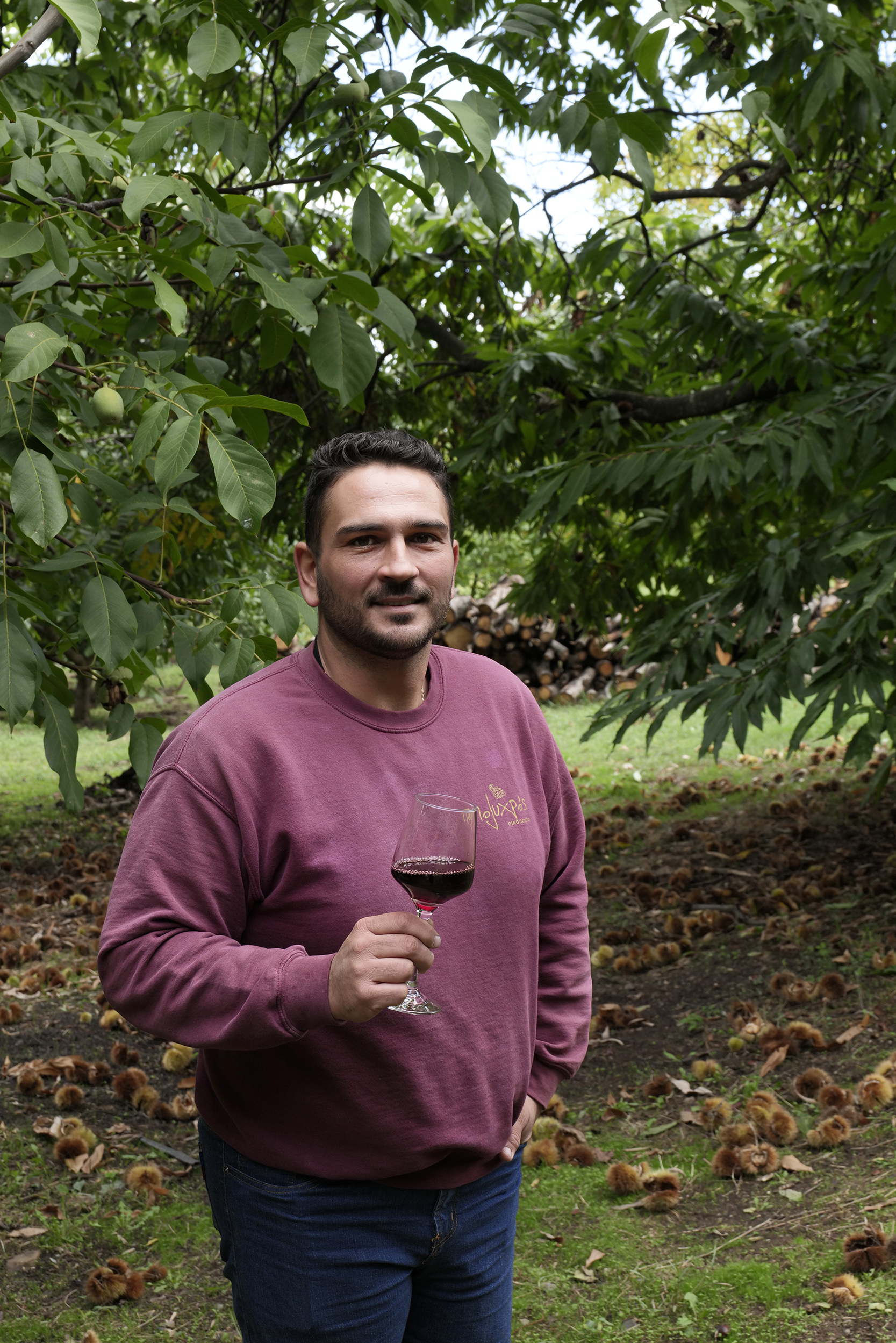
On the slopes above Skotina, at the foot of Mount Olympus, high above the coastal zone and surrounded by chestnut and walnut trees, lies the small family winery Polychros. The location is called “Anavrykos,” named after the springs that bubble up here, and one of the winery’s wines carries the same name.
Giorgos Polychros, together with his younger brother Michalis, his wife Eleftheria, and their mother Dimitria, continue the tradition started by his father, Athanasios, who built the winery in 1997. Athanasios, who passed away in 2019, left a strong mark in distillation, in wine, and in the consciousness of the rest of the family.
Giorgos, now thirty-three, has a strikingly clear gaze – both literally and in terms of how he sees the business evolving. He studied agricultural technology at the Technological Educational Institute of Larissa in 2015 and is steering the estate on a path that is progressive, outward-looking, and refreshingly modern.
With the help of oenologist Artemis Toulaki, he produced his first bottled red wines in 2020, in the midst of the pandemic. The twenty-eight quarter acres they now cultivate yield around eight thousand bottles, a mix of blends and single-varietal wines: “Anavrykos,” a syrah–merlot–limnio blend; “Chrysi Pestrofa” (“Golden Trout”), named after the trout lake on the estate, a blend of roditis and sauvignon blanc; “Roz Pestrofa,” a rosé moschato; “19 Elata,” a 100% limnio named after the nineteen fir trees on the property; and “Sys,” meaning wild boar, a 100% merlot.
There is also an experimental planting of vidiano, a Cretan variety, in small production, and the family continues to make tsipouro from moschato grapes in the two stills built by their father. The estate is open all year for visits, mainly for tastings, and in the winter months by appointment.
Watching the rest of the family gather the season’s chestnuts from the estate’s generous trees, we drive back down the village’s steep descents with the aftertaste of the wines and the tsipouro – made without anise, which is the best proof of the care and craftsmanship that define the Polychros winery.
03
Kourtis Winery
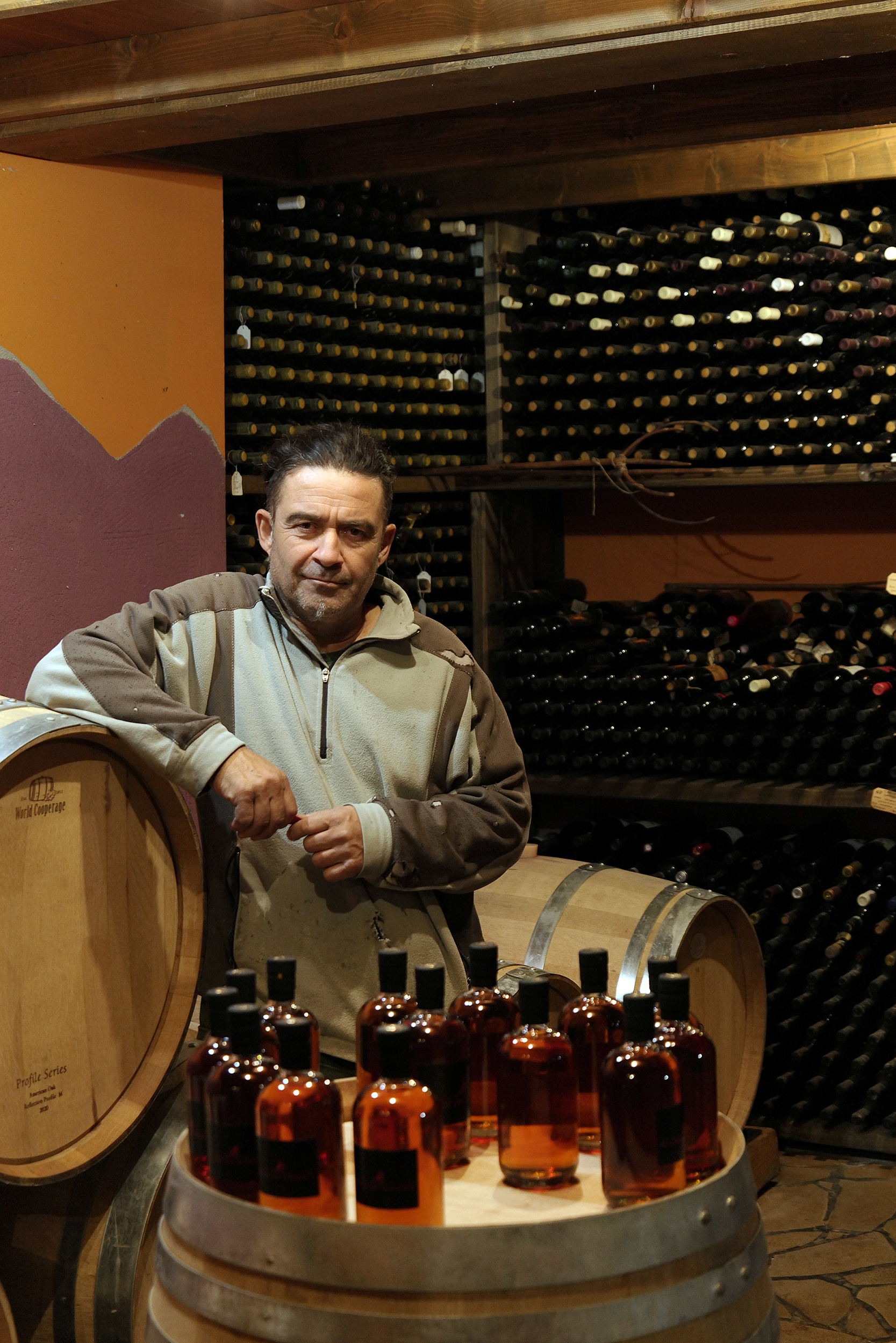
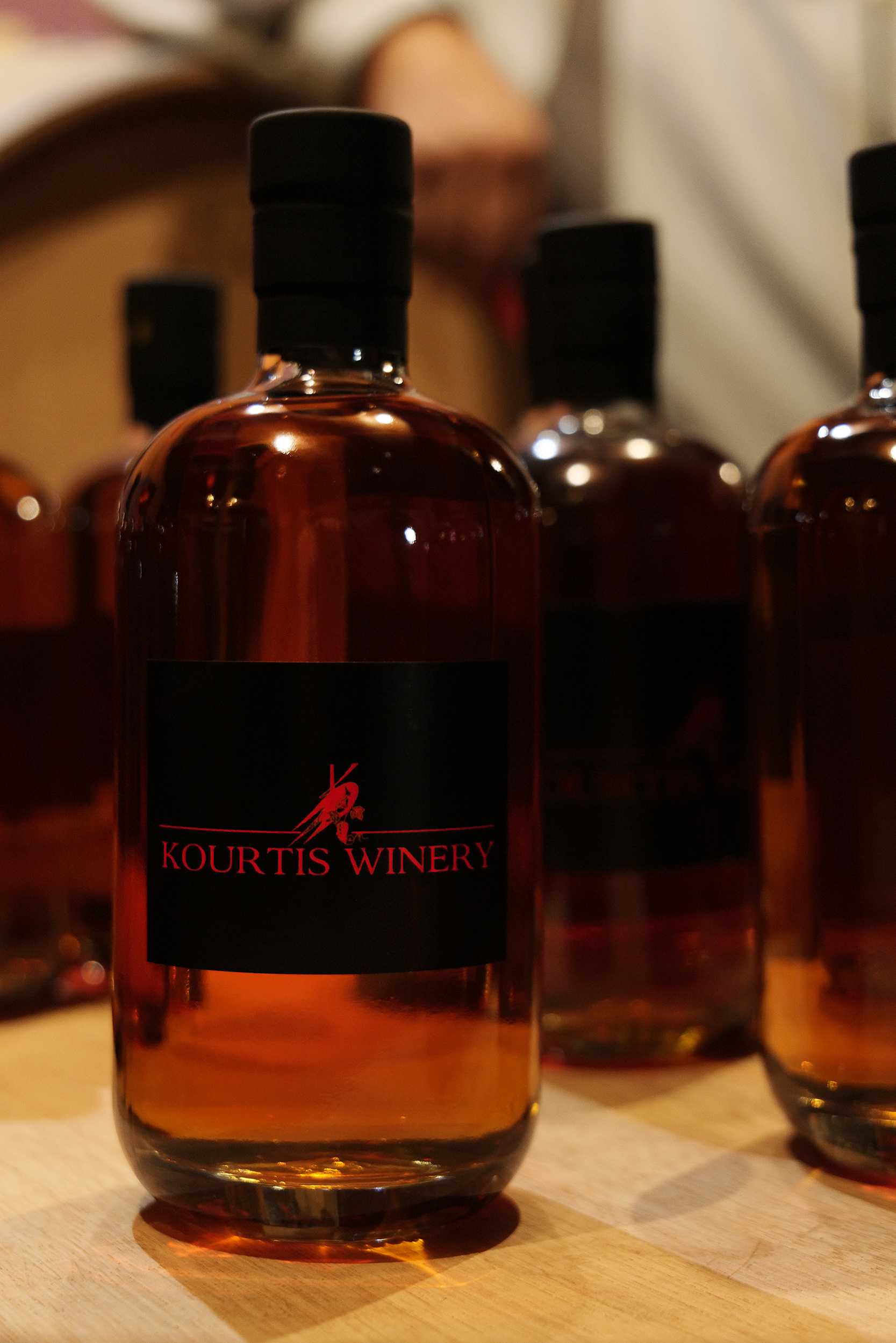
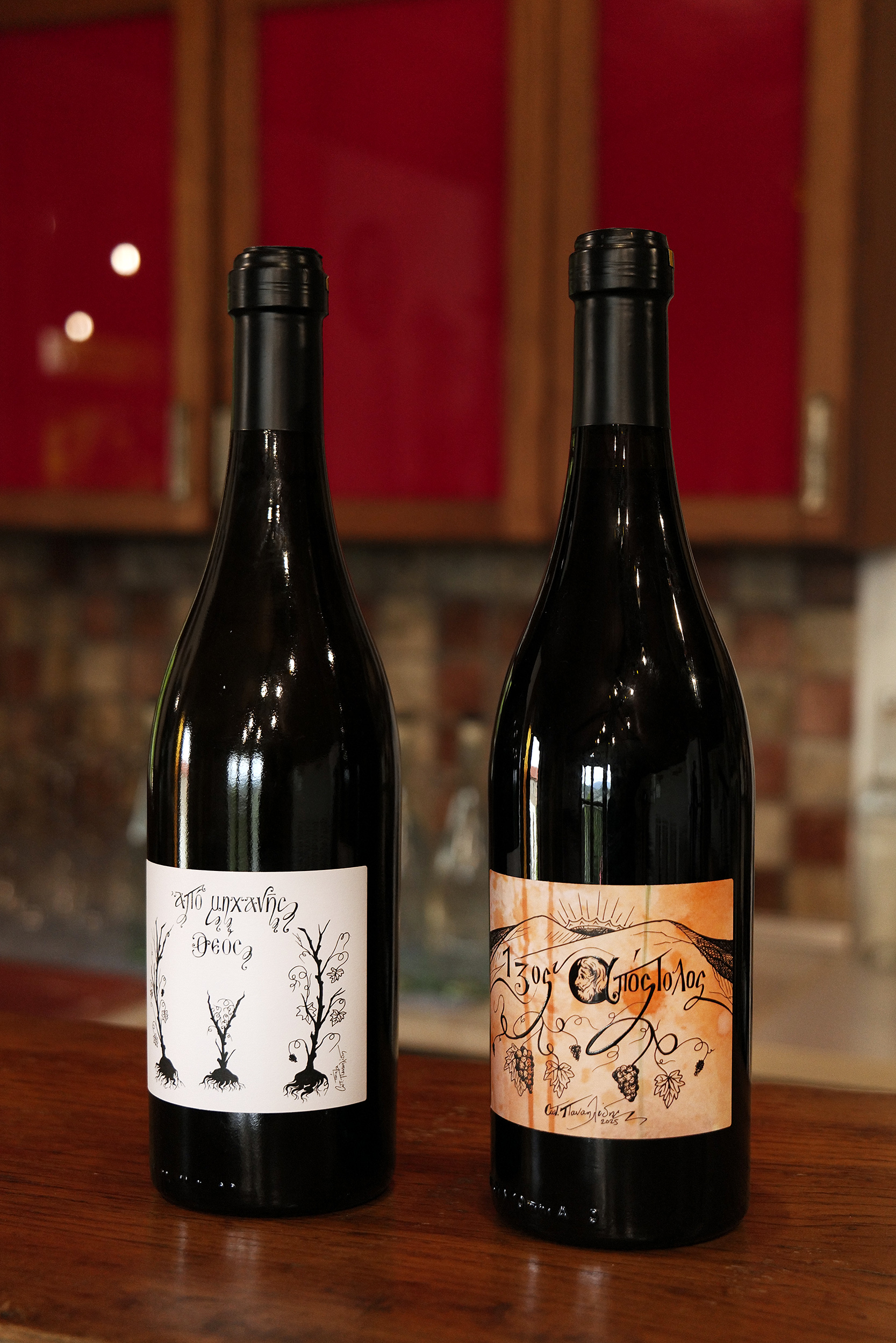

The village of Rachi, in the region of Pieria, just fourteen kilometers from the city of Katerini, lies between the Pieria Mountains – mythological home of the Muses – Mount Olympus to the south, and the sea to the east, enjoying an ideal climate at an altitude of about three hundred meters. On this ridge, in sandy-clay soils of medium composition, the Kourtis family cultivates about seventy stremmas of vineyards.
When we arrive at the winery, following the GPS, the smell of wine is the only sure signal that we have reached the right place, because from the outside the building looks more like a beautifully crafted traditional house than a professional facility. Inside, we find Apostolos Kourtis fully immersed in work, with a pump transferring wine into tanks and himself watching the process carefully.
Back outside in the courtyard, under dense tree canopies, he pours a glass of aged distillate he produces, immediately warming the mood. The Kourtis family once grew tobacco, as was common in the area, but they always kept a vegetable garden and a small vineyard for their own wine and tsipouro.
As tobacco cultivation declined, they began considering a more professional approach to wine production. In 1997 they started with ten quarter acres in the area of Toumba, on a ridge at the entrance of the village with limestone soil. The first varieties planted were Trebbiano, Chardonnay, Cabernet, Merlot, and Syrah.
Professional-scale vinification would wait a few more years, until 2006, but the results pushed Apostolos into a path of constant progress. His love of wine grew into devotion, with a philosophy that is anything but commercially driven. All vineyards are organically farmed, and Greek varieties such as Xinomavro, Agiorgitiko, Vidiano, and Assyrtiko have been added to the range, in both blends and single-varietal bottlings.
Tasting the wines in the beautiful visitor area, with its large windows, with bites of wonderful cured meats, cheeses, and homemade pie made by Mrs. Kourtis, it becomes immediately clear why everyone urged us to visit this particular winery. Each bottle, dressed in its distinctive label designed by artist Sotiris Panailidis, seems to hide a different wine story – evolving, layered, and multidimensional.
Kourtis Winery places real emphasis on the visitor experience, on tastings and tours, offered all year round by prior arrangement.
04
VOÍ Wines
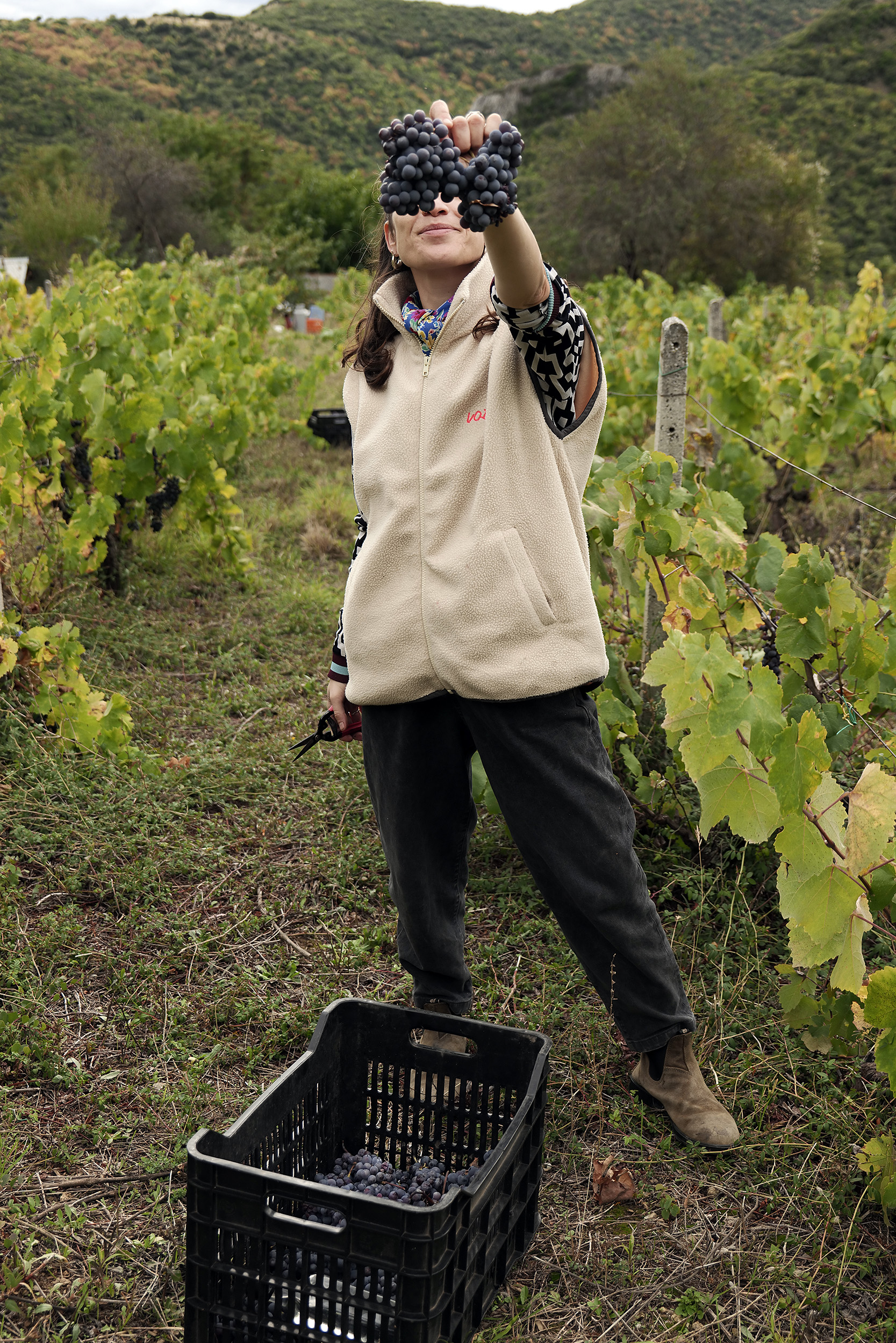
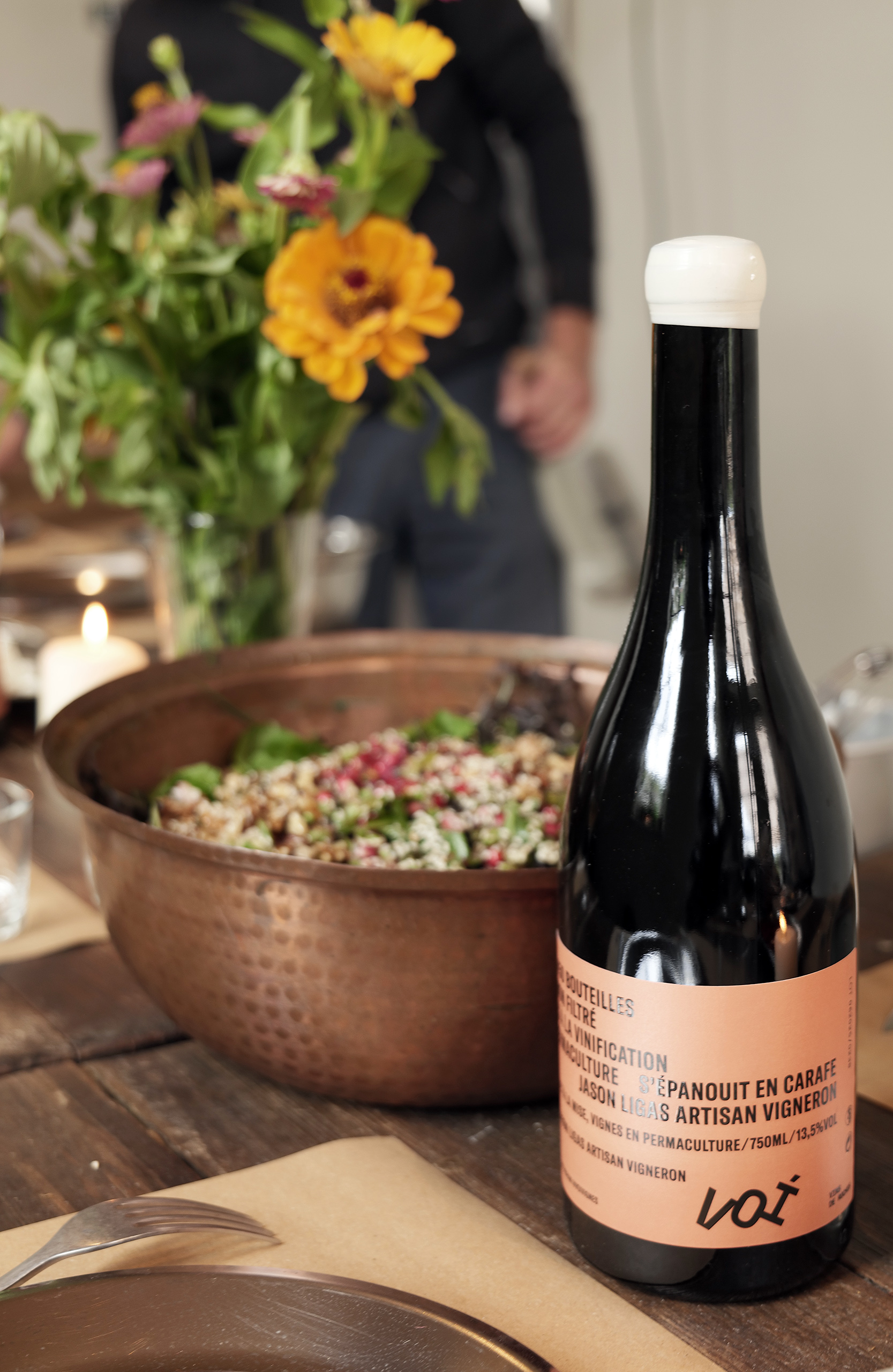
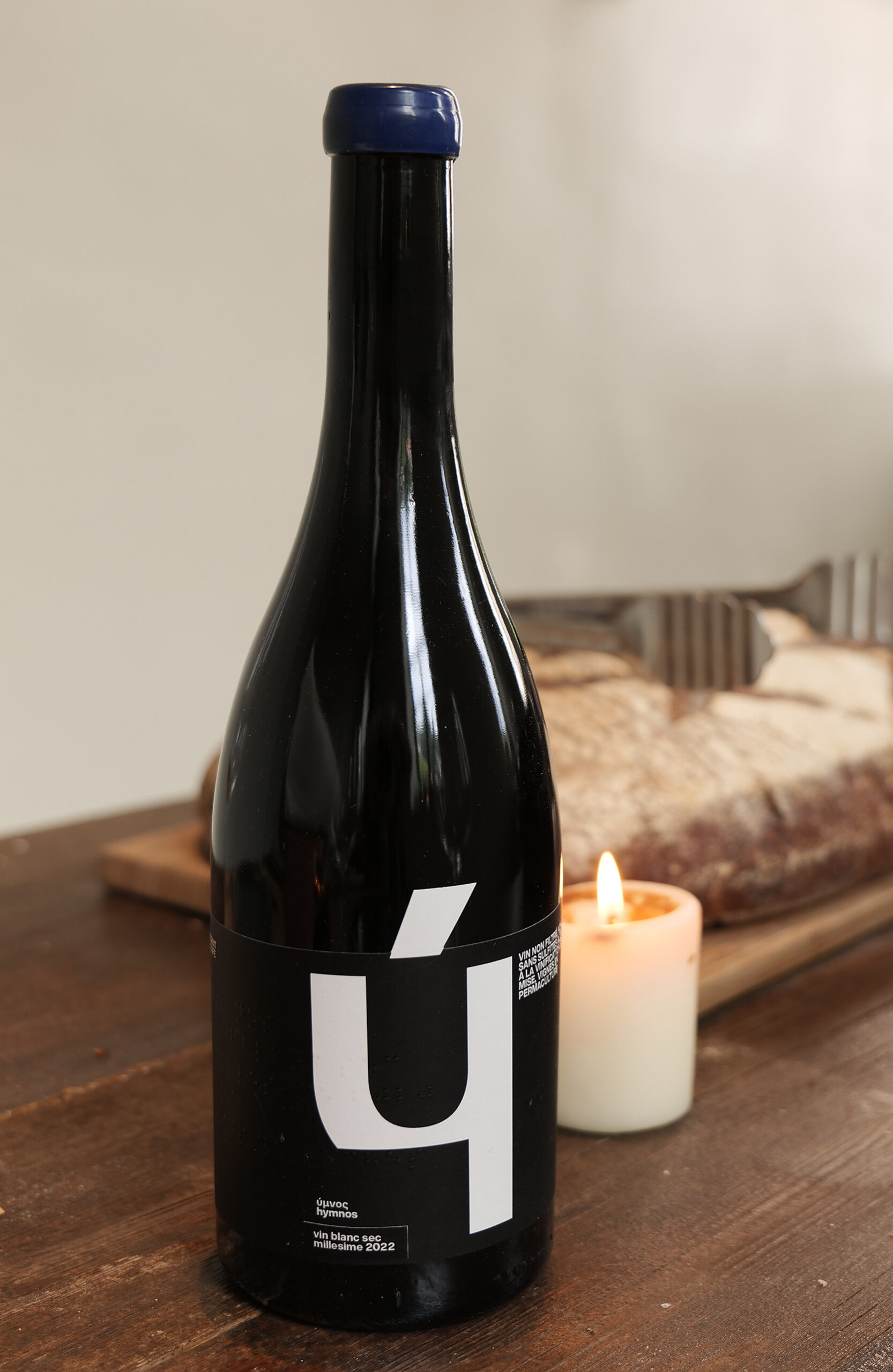
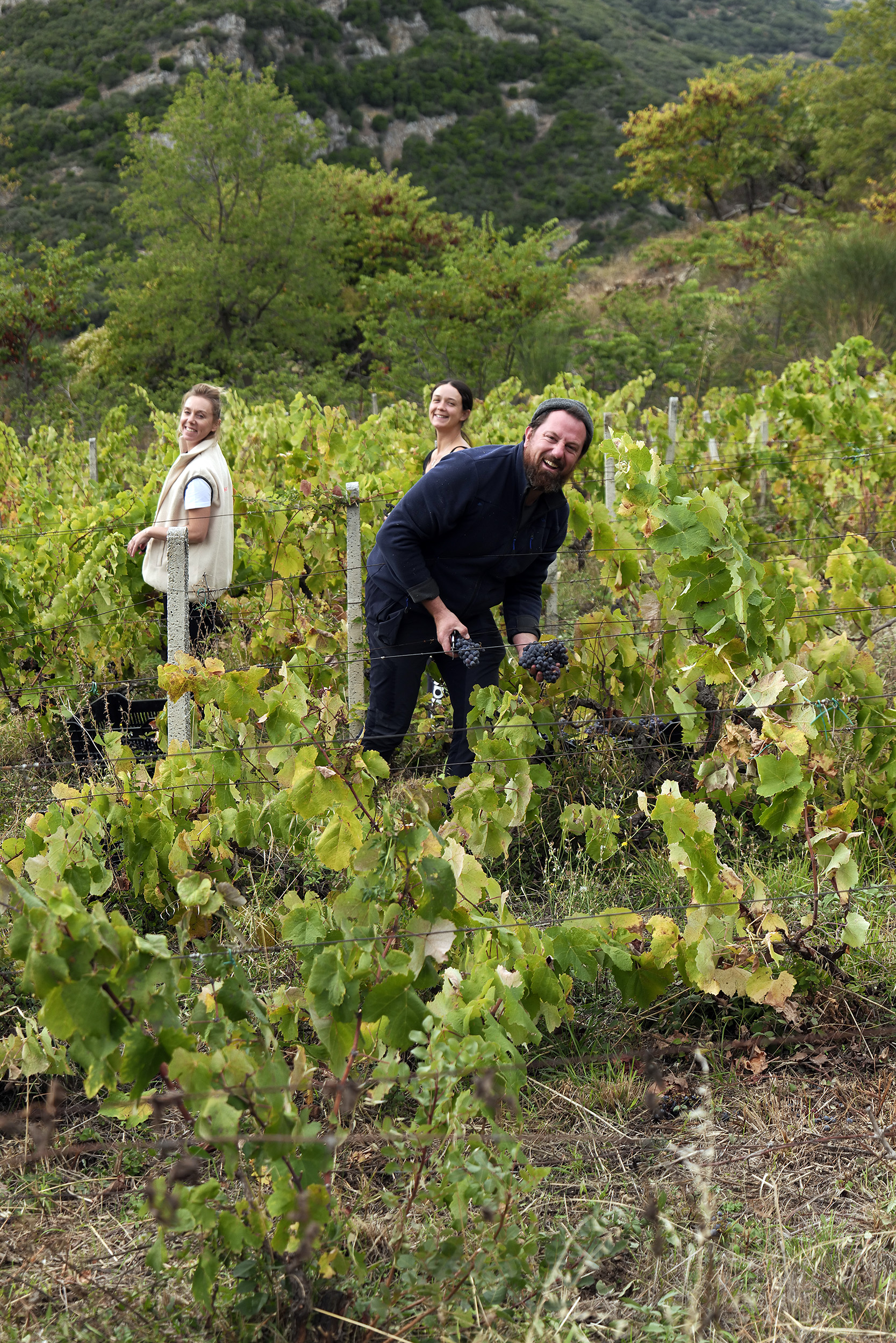
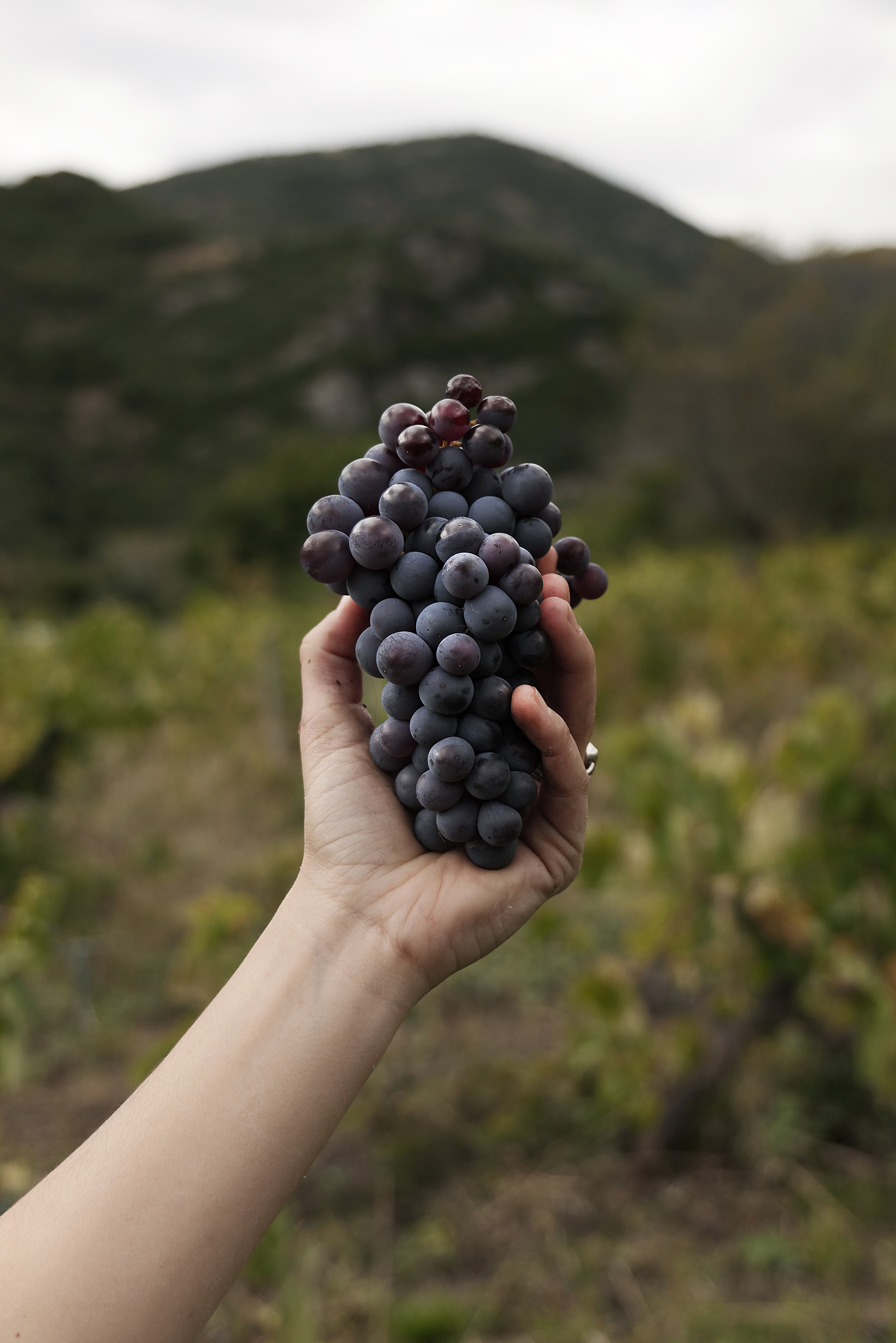
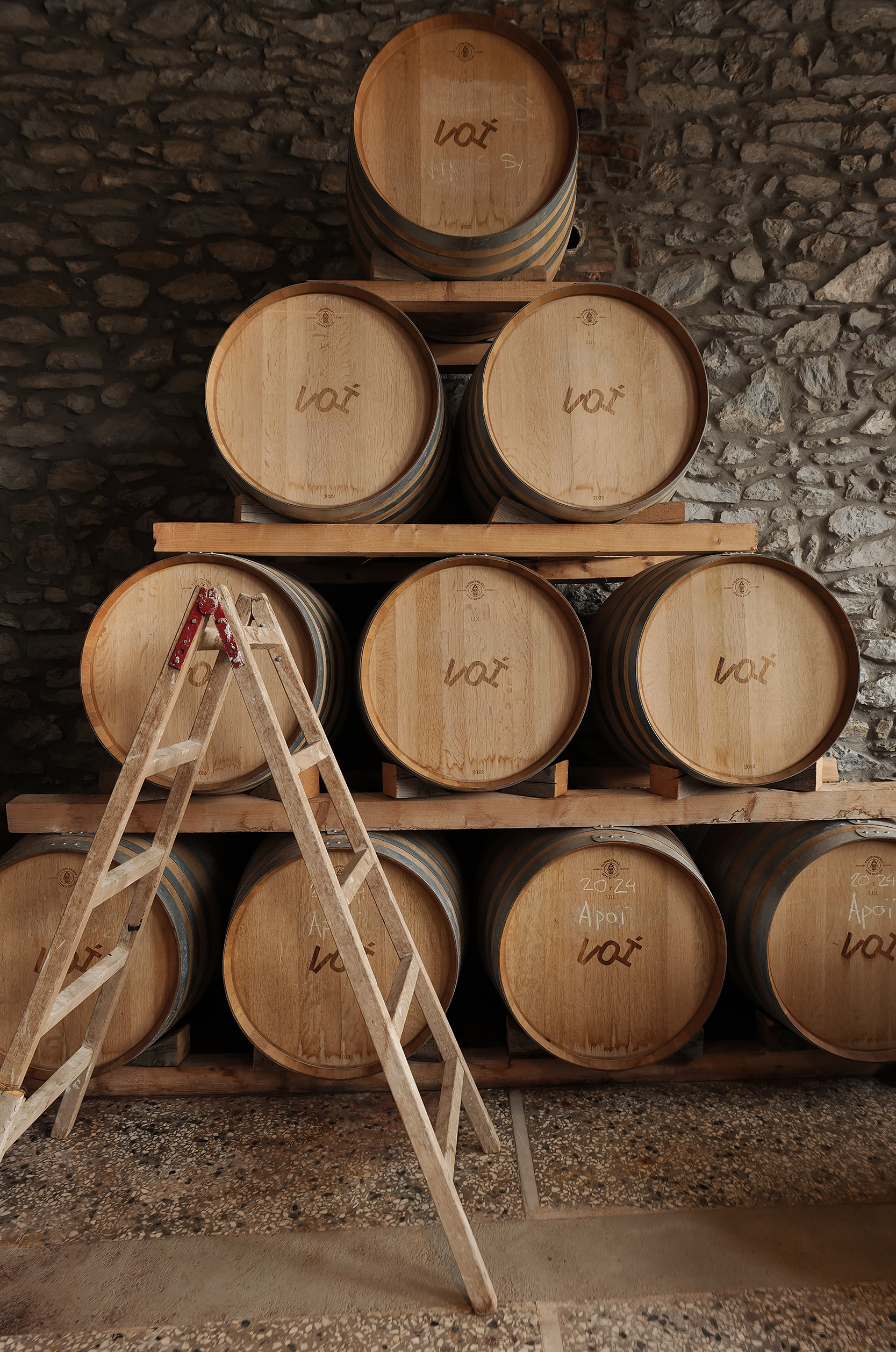
Meeting Iason Ligas – his winery, his wines, his friends, and his philosophy – was from the very first moment an experience of positive energy, instant, effortless rapport, and a sense of adventure. Reaching the area of Krania Olympus, within the Rapsani viticultural zone, about an hour and a half before our scheduled meeting, we went in search of the vineyard where Iason and his friends – some from other parts of Greece and others from southern France – were harvesting.
The spot called Tsokatos, where this particular parcel lies, appeared suddenly at a sharp turn on the dirt road I had been following for about one and a half kilometers. The team works quietly, carefully cutting the clusters from the mixed plantings of Stavroto, Xinomavro, and Krasato, varieties that, as Iason tells us, he is trying to preserve.
At elevations from three hundred to six hundred and thirty meters, on steep slopes and schist stone, across sixty scattered stremmas, these varieties are cultivated biodynamically. The permaculture philosophy he follows is neither strictly organic nor conventional. Iason uses his own preparations, based on propolis, seaweed, essential oils, and rock powders such as zeolite, and he works closely with the phases of the moon, from pruning and vinification to even the transport of the wine.
As we gradually get to know the rest of the team, we find ourselves, without a second thought, helping to carry the baskets of grapes, since the small truck has arrived to take the day’s harvest to the winery. At thirty-six, Iason has already completed five years at this winery, which is housed in the old school building, constructed in 1905 and later used as the local Resistance headquarters, in the center of the stone-built amphitheatrical village.
While the rest of the team begins to prepare food for all of us, to be served at the magnificent monastic table in the high-ceilinged hall, with black pork from the Monastery of Agios Dionysios as the centerpiece, Iason talks about the challenges he has faced as a grower-winemaker in the area: climate change, which once pushed the harvest into December; wild boars; and the lack of people willing to work in the vineyards.
Our Dionysian experience at VOÍ Wines culminates in the shared meal at the table, the constant hum of animated conversations, the arrival of new friends bringing their own wines to pour, the highly individual character of Iason’s wines, and, finally, the “price” of taking the wrong direction on the National Road as we drive away from Krania Olympus, in an absolutely buoyant mood from the whole experience.



